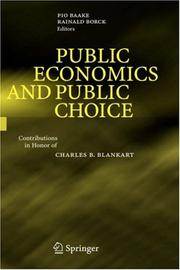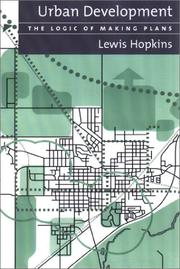| Listing 1 - 5 of 5 |
Sort by
|
Book
ISBN: 9783642028649 9783642028656 3642028640 9786612980534 128298053X 3642028659 Year: 2010 Volume: 43 Publisher: Heidelberg: Springer,
Abstract | Keywords | Export | Availability | Bookmark
 Loading...
Loading...Choose an application
- Reference Manager
- EndNote
- RefWorks (Direct export to RefWorks)
This book discusses collective decision making from the perspective of social choice and game theory. The chapters are written by well-known scholars in the field. The topics range from Arrow’s Theorem to the Condorcet and Ostrogorski Paradoxes, from vote distributions in the European Council to influence processes and information sharing in collective decision making networks; from cardinal utility to restricted domains for social welfare functions; from rights and game forms to responsibility in committee decision making; and from dueling to bargaining. The book reflects the richness and diversity of the field of collective decision making and shows the usefulness and adequacy of social choice and game theory for the study of it. It starts with typical social choice themes like Arrow’s Theorem and ends with typical game theoretical topics, like bargaining and interval games. In between there is a mixture of views on collective decision making in which both social choice and game theoretic aspects are brought in. The book is dedicated to Harrie de Swart, who organized the well-known Social Choice Colloquia at the University of Tilburg in the Netherlands.
Economics/Management Science. --- Economic Theory. --- Public Finance & Economics. --- Economics. --- Finance. --- Economie politique --- Finances --- Group decision making --- Social choice --- Game theory --- Mathematical models --- Game theory. --- Group decision making -- Mathematical models. --- Social choice. --- Sociology & Social History --- Business & Economics --- Social Sciences --- Economic Theory --- Social Change --- Decision making. --- Choice, Social --- Collective choice --- Public choice --- Deciding --- Decision (Psychology) --- Decision analysis --- Decision processes --- Making decisions --- Management --- Management decisions --- Decision making --- Economic theory. --- Public finance. --- Economic Theory/Quantitative Economics/Mathematical Methods. --- Public Economics. --- Choice (Psychology) --- Social psychology --- Welfare economics --- Problem solving --- Cameralistics --- Public finance --- Currency question --- Economic theory --- Political economy --- Social sciences --- Economic man --- Public finances --- Group decision making - Mathematical models

ISBN: 9783540727811 3540727817 9783540727828 3642091873 9786610944477 1280944471 3540727825 Year: 2007 Publisher: Berlin: Springer,
Abstract | Keywords | Export | Availability | Bookmark
 Loading...
Loading...Choose an application
- Reference Manager
- EndNote
- RefWorks (Direct export to RefWorks)
This volume collects essays in honor of Charles Beat Blankart on the oc- th sion of his 65 birthday. Blankart's research is mainly in the area of public finance and public choice. He is also known for his interest in real world problems and intellectual curiosity. These features seem to be well c- veyed by the contributions. Born in Switzerland, Blankart completed his Ph. D. in Basel before moving to Germany. The typically Swiss perspective on individual freedom, h- ever, has remained with him. Blankart has taught at the Free University of Berlin, the University of the Federal Armed Forces in Munich, Technical University and Humboldt University in Berlin. Throughout his prof- sional positions, Blankart has contributed to various fields, including p- lic finance, public choice, federalism and industrial organization and re- lation. He has left significant marks in these fields, emphasizing throughout how incentives shape the behaviour of individuals, be it in markets or in government. For example, his best selling textbook - fentliche Finanzen in der Demokratie, is unique in bringing a unified p- spective to the study of public finance, treating politicians as ordinary self interested individuals and doing largely away with the benevolent welfare maximizing social planner.
Social choice. --- Finance, Public. --- Public goods. --- Choix collectif --- Finances publiques --- Biens collectifs --- Social choice --- Finance, Public --- Public goods --- Blankart, Charles Beat --- Economics. --- Finance. --- AA / International- internationaal --- 336.00 --- 336.001 --- Goods, Public --- Welfare economics --- Cameralistics --- Public finance --- Currency question --- Choice, Social --- Collective choice --- Public choice --- Choice (Psychology) --- Social psychology --- Organisatie van de overheidsfinanciën. Overheidsuitgaven en -inkomsten: algemeenheden. --- Free rider problem (Economics) --- Economic theory. --- Public finance. --- Public Economics. --- Economic Theory/Quantitative Economics/Mathematical Methods. --- Organisatie van de overheidsfinanciën. Overheidsuitgaven en -inkomsten: algemeenheden --- Economic theory --- Political economy --- Social sciences --- Economic man --- Public finances

ISBN: 1610913450 1597269417 1417539534 9781417539536 9781610913454 1559638532 9781559638531 1559638524 9781559638524 9781597269414 Year: 2001 Publisher: Washington, DC : Island Press,
Abstract | Keywords | Export | Availability | Bookmark
 Loading...
Loading...Choose an application
- Reference Manager
- EndNote
- RefWorks (Direct export to RefWorks)
City planning. --- City planning --- Social choice. --- Choice, Social --- Collective choice --- Public choice --- Choice (Psychology) --- Social psychology --- Welfare economics --- Cities and towns --- Civic planning --- Land use, Urban --- Model cities --- Redevelopment, Urban --- Slum clearance --- Town planning --- Urban design --- Urban development --- Urban planning --- Land use --- Planning --- Art, Municipal --- Civic improvement --- Regional planning --- Urban policy --- Urban renewal --- Evaluation. --- Government policy --- Management --- Stedenbouw --- Ruimtelijke ordening --- Planologie

ISBN: 3540261982 9783540280835 3642065627 9786610306459 1280306459 3540280839 9783540261988 Year: 2005 Publisher: Berlin : Springer,
Abstract | Keywords | Export | Availability | Bookmark
 Loading...
Loading...Choose an application
- Reference Manager
- EndNote
- RefWorks (Direct export to RefWorks)
Kuklys examines how Nobel Prize-winning economist Amartya Sen’s approach to welfare measurement can be put in practice for poverty and inequality measurement in affluent societies such as the UK. Sen argues that an individual’s welfare should not be measured in terms of her income, but in terms what she can actually do or be, her capabilities. In Chapters 1 and 2, Kuklys describes the capability approach from a standard welfare economic point of view and provides a comprehensive literature review of the empirical applications in this area of research. In the remaining chapters, novel econometric techniques are employed to operationalise the concepts of functionings and capability to investigate inequality and poverty in terms of capability in the UK. Kuklys finds that capability measurement is always a useful complement to traditional monetary analysis, and particularly so in the case of capability-deprived disabled individuals.
Microeconomics --- Economic schools --- economisch denken --- Sen, Amartya --- People with disabilities --- Poverty --- Social choice --- Welfare economics --- 330.580 --- AA / International- internationaal --- GB / United Kingdom - Verenigd Koninkrijk - Royaume Uni --- Cripples --- Disabled --- Disabled people --- Disabled persons --- Handicapped --- Handicapped people --- Individuals with disabilities --- People with physical disabilities --- Persons with disabilities --- Physically challenged people --- Physically disabled people --- Physically handicapped --- Persons --- Disabilities --- Sociology of disability --- Economic conditions --- Mathematical models --- Gecontroleerde economie. Geleide economie. Welvaarststaat. Algemeenheden --- Sen, Amartya, --- Amadiya Sen, --- Amartya Kumar Sen, --- Amartya Sen, --- Amartya Sena, --- ʻAmāttaya Sen, --- Sen, A. K. --- Sen, Amadiya, --- Sen, Amarty K. --- Sen, Amartya K. --- Sen, Amartya Kumar --- Sen, Amartya Kumar, --- Sen, Armatya, --- Sena, Amartya, --- 阿瑪蒂亚・森, --- Mathematical models. --- Economic theory. --- Economic Theory/Quantitative Economics/Mathematical Methods. --- Economic theory --- Political economy --- Social sciences --- Economic man --- Welfare economics - Mathematical models. --- Social choice - Mathematical models. --- Poverty - Mathematical models. --- People with disabilities - Great Britain - Economic conditions - Case studies. --- Acqui 2006 --- Welvaartseconomie.
Book
ISBN: 9788847017788 9788847017771 Year: 2010 Publisher: Milano Springer Milan Imprint Springer
Abstract | Keywords | Export | Availability | Bookmark
 Loading...
Loading...Choose an application
- Reference Manager
- EndNote
- RefWorks (Direct export to RefWorks)
In economics agents are assumed to choose on the basis of rational calculations aimed at the maximization of their pleasure or profit. Formally, agents are said to manifest transitive and consistent preferences in attempting to maximize their utility in the presence of several constraints. They operate according to the choice imperative: given a set of alternatives, choose the best. This imperative works well in a static and simplistic framework, but it may fail or vary when 'the best' is changing continuously. This approach has been questioned by a descriptive approach that springing from the complexity theory tries to give a scientific basis to the way in which individuals really choose, showing that those models of human nature is routinely falsified by experiments since people are neither selfish nor rational. Thus inductive rules of thumb are usually implemented in order to make decisions in the presence of incomplete and heterogeneous information sets; errors and biases are the natural counterpart of learning and adapting processes. The papers collected in this volume show that economic agents, individual or aggregate, do not conform to standard economic models, highlighting how a different framework - complexity theory - could help to explain and understand the choice and decision process of economic agent.
Mathematics. --- Game Theory, Economics, Social and Behav. Sciences. --- Complex Networks. --- Economic Systems. --- Economics. --- Mathématiques --- Economie politique --- AA / International- internationaal --- 305.6 --- Risicotheorie, speltheorie. Risicokapitaal. Beslissingsmodellen. --- Consumer behavior --- Decision making --- Economics --- Econophysics --- Finance, Personal --- Financial risk management --- Rational choice theory --- Risk --- Deciding --- Decision (Psychology) --- Decision analysis --- Decision processes --- Making decisions --- Management --- Management decisions --- Choice (Psychology) --- Problem solving --- Behavior, Consumer --- Buyer behavior --- Decision making, Consumer --- Human behavior --- Consumer profiling --- Market surveys --- Behavioral economics --- Behavioural economics --- Uncertainty --- Probabilities --- Profit --- Risk-return relationships --- Social choice --- Risk management --- Financial management, Personal --- Financial planning, Personal --- Personal finance --- Personal financial management --- Personal financial planning --- Finance --- Financial literacy --- Statistical physics --- Economic statistics --- Econometrics --- Economic sociology --- Socio-economics --- Socioeconomics --- Sociology of economics --- Sociology --- Psychological aspects --- Social aspects --- Methodology --- Philosophy --- Sociological aspects --- Statistical methods --- Risicotheorie, speltheorie. Risicokapitaal. Beslissingsmodellen --- Planning
| Listing 1 - 5 of 5 |
Sort by
|

 Search
Search Feedback
Feedback About UniCat
About UniCat  Help
Help News
News